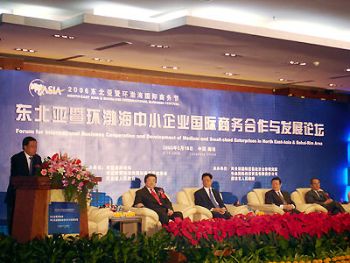| Tools: Save | Print | E-mail | Most Read |
| Regional Cooperation the Way Forward for SMEs |
| Adjust font size: |
Regional economic integration has and continues to provide both commercial opportunities and challenges to China's small and medium enterprises (SMEs), according to participants at the Forum on International Business Cooperation and Development of Small and Medium Enterprises in Northeast Asia and Bohai-Rim Area (Hebei Province, May 18-20). The forum is an important part of the Northeast Asia & Bohai-Rim International Business Festival.
"Regional cooperation is the inevitable trend of SME development," said Chai Haitao, director of the International Trade Research Academy of the Ministry of Commerce. Chai highlighted the two key characteristics of regional cooperation: "The first is that trade creates economic return." Countries with geological relations can give one another more favorable policies than even those between WTO member countries, and this promotes investment. The second is that trade can "transfer economic returns," meaning that trade with countries outside a particular region has and can be transferred inside the region. According to Chai, China's regional economic development strategy is divided into two parts, north and south. In the south, a free trade and economic area has been planned between China and the Association of South-East Asian Nations (ASEAN). In the north, the Bohai-Rim economic circle will be built into the industrial and financial center of north and east Asia, making the east China economy the center of the Pan-East Asian economic system. Key east and north Asian countries are China, Japan, South Korea, North Korea, Mongolia and Russia. Chai pointed out that while Japan and South Korea have the advantage of funds and technologies, they lack natural resources and labor. China, on the other hand, is rich in natural resources and labor, but lacks funding and technological know-how. North Korea, Mongolia and Russia are similar to China. SMEs are a major driving force of China's rapidly developing economy and account for 90 percent of all companies in China. The Chinese government has introduced policies to encourage SMEs to engage in international cooperation and make the push into international markets. To supplement existing policies, Chen Naixing, director of the Research Center for SMEs under the Chinese Academy of Social Sciences, put forward following suggestions to further boost the development of the SME sector:
Another significant aspect of SME development is the legal system, and experts agree that a top priority is to establish a sound legal framework. Former South Korean Prime Minister Lee Soo-sung said that cultural compatibility is something else that the region's SMEs can take advantage of. Culture is a powerful and important means of promoting products and enhancing exchange. The three-day business festival was co-sponsored by the All-China Federation of Commerce and Industry, Boao Forum for Asia, Chinese Enterprises Association and the Hebei Provincial People's Government. With the theme, "Harmonious Cooperation and Mutual Development," the festival attracted more than 5,000 distinguished guests including high-level government officials, diplomatic envoys to China, business leaders, investors, renowned scholars and academics, and representatives from trading firms, chambers of commerce, and investment media agencies. (China.org.cn by Li Jingrong, May 25, 2006)
|
| Tools: Save | Print | E-mail | Most Read |
 |
| Related Stories |
| Product Directory China Search |
Country Search Hot Buys |
